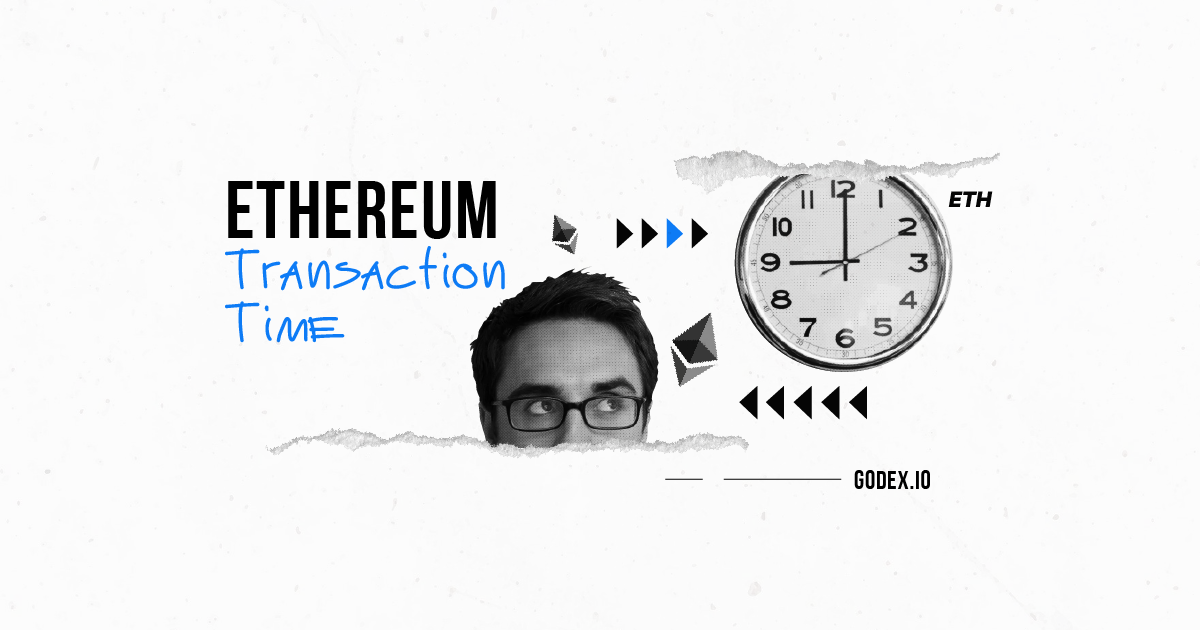Table of Contents
What is Ethereum transaction time?
When using any payment system, one of the most important performance indicators is the value of the maximum transaction speed. Everyone knows the situation with classic payment systems like Visa and Mastercard, in which transactions are made almost instantly.
However, when it comes to Ethereum crypto, not everything is so unambiguous. The time it takes to process a transaction on the Ethereum network hinges on various factors, and sometimes it can be seconds, sometimes days.
What causes slow transactions?
Compared to the traditional systems mentioned above, the throughput of Ethereum is much lower. For example, while Visa may impress us with its ability to handle no less than 65,000 transactions per second, Ethereum boasts a modest 15. Hence, the transaction time is increased when the network is congested, or, put differently, the demand exceeds the Ethereum network capacity.
By the way, such an increased demand leads to an increase in the transaction fee, which is also not good for the one who pays.
How long does it take to transfer Ethereum from one wallet to another?
The transfer time from one wallet to another depends on the type of wallet and the number of confirmations your transaction requires. ETH coins are sent faster from a hot wallet as they are already on the net. Under a normal network load, the ETH transaction time ranges from 16 seconds (so much time needed for one confirmation) to 5 minutes (if more confirmations are required).
Transferring Ether from a cold wallet will take a little longer, as it involves dealing with additional security measures.
It should be noted that the cost of gas that you are ready to pay also affects the Ethereum transaction speed. Offering a higher price will speed up the process and transfer your ETH faster.
How long does it take to transfer Ethereum from a wallet to an exchange?
Transferring Ethereum from a wallet to an exchange is a more complicated process than inter-wallet transfer. Reputable exchanges, in order to protect themselves from unauthorized transactions, require a large number of confirmations. Coinbase, for example, requires 30 confirmations for each transaction, which means it will take 10 minutes or so to transfer Ether from your wallet to this exchange.
If you then want to sell your ETH for fiat, it will take even more time. Depending on which exchange platform you use, the transaction completion time can vary from a few seconds to several business days.
Exchange services such as Godex.io inform their users before sending coins about possible delays associated with the need for more confirmations.
Conclusion
To sum it up, Ethereum transactions tend to be pretty fast; however, when compared with transactions utilizing conventional payment systems such as Visa and Mastercard, there is still room for growth. In fact, no one can guarantee the ETH transaction time, since it depends on several variable factors.
Each Ethereum transaction requires a certain number of confirmations, which ensures the security of the network. Accordingly, the more confirmations, the longer the transaction will take. However, one confirmation on the Ethereum network takes only about 16 seconds, which means that the average Ethereum transaction time is just a few minutes.
The situation is different for users who want to exchange their Ethereum for fiat currency. In this case, the waiting time can be several business days before the fiat money is credited to the bank account.
FAQ
How to speed up ethereum transaction time?
To speed up the transfer process, use an Ethereum online wallet for your transactions.
Also, don’t skimp on miner rewards, the higher the gas price you pay, the sooner your transaction will be processed.
Choose exchange platforms that require fewer confirmations per transaction. However, keep in mind that in this case, the transaction speed may be offset by your transfer security.
What does transaction time in Ethereum depend on?
Time for Ethereum transactions in general depends on where ETH is sent, and how many other transfers are being made at that time on the network. The longer the queue of users who want to somehow manage their assets on the Ethereum network, the longer the waiting time.
It also depends on which wallet the coins are sent from: cold or hot.
What is the block time of Ethereum?
Ethereum average block time is between 14 and 16 seconds.
Start a Cryptocurrency exchange
Try our crypto exchange platform
Disclaimer: Please keep in mind that the content of this article is not financial or investing advice. The information provided is the author’s opinion only and should not be considered as direct recommendations for trading or investment. Any article reader or website visitor should consider multiple viewpoints and become familiar with all local regulations before cryptocurrency investment. We do not make any warranties about reliability and accuracy of this information.
 Alex Tamm
Alex Tamm 
Read more
The exponential growth of Bitcoin Satoshi Vision (BSV) against the general bear trend on the cryptocurrency market in autumn 2019 has impressed the community. Due to the increasing market capitalization, the newly emerged altcoin was ranked 5th on CoinMarketCap and managed to maintain its high position at the beginning of 2020. In the article we […]
EOS is definitely on the list of the strongest and most stable projects in the crypto world. Despite the fact that the currency entered the market less than 3 years ago, it consistently occupies one of the top 10 places in the rating for project capitalization. it is often called the “main competitor of Ethereum”. […]
Ripple (XRP) price has been widely discussed by the cryptocurrency community since it has gained public interest in 2017, even though it was founded by Chris Larsen and Jed McCaleb years before. The platform offers innovative blockchain solutions for the banking sector and has the potential to disrupt the whole finance industry. In recent years, […]
In this article we will talk about Ripple (XRP) and its price prediction. What is Ripple (XRP) Ripple is a San Francisco-based startup that was launched in 2012 by Ripple Labs as a global network both for cross-currency and gross payments. Ripple history began in 2004 with the discussions around the digital coin in the […]
You may well think that an article dedicated to a Tether price prediction or the Tether price in general is a little bit strange — it is a stablecoin after all. However, the price of Tether does fluctuate significantly, although it is nowhere near as volatile as non-stablecoin cryptos. This means that staying up to […]
In the article we share our vision at Zcash cryptocurrency main features and add several price predictions. As cryptocurrencies gain global acceptance and decentralisation slowly enters our lives, privacy becomes the main concern when talking about blockchain adoption. It is no secret that distributed ledger is by far the most secure and transparent technology ever […]